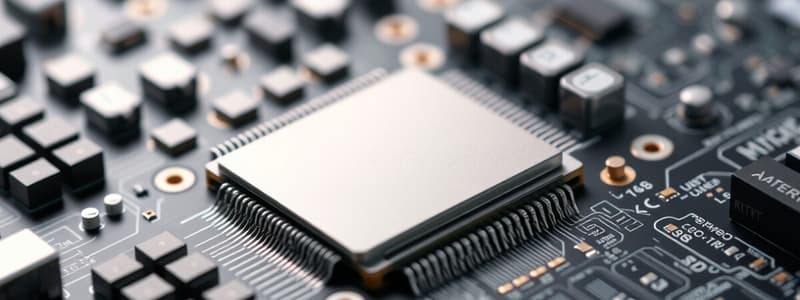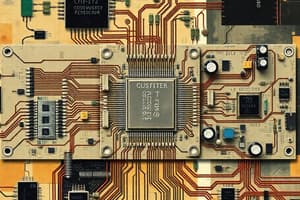Podcast
Questions and Answers
What is the purpose of the oscillator in the 8051 microcontroller architecture?
What is the purpose of the oscillator in the 8051 microcontroller architecture?
- To facilitate communication between external devices
- To manage data storage
- To function as a clock for the CPU (correct)
- To control power usage
How many user-defined flags does the 8051 microcontroller support?
How many user-defined flags does the 8051 microcontroller support?
- 256
- 512
- 128 (correct)
- 64
What type of communication interface does the 8051 microcontroller use for serial data transfer?
What type of communication interface does the 8051 microcontroller use for serial data transfer?
- Serial Peripheral Interface (SPI)
- Universal Asynchronous Receiver/Transmitter (UART) (correct)
- Inter-Integrated Circuit (I2C)
- Universal Synchronous Receiver/Transmitter (USRT)
What is the bit size of each timer in the 8051 microcontroller?
What is the bit size of each timer in the 8051 microcontroller?
Which of the following describes the data bus of the 8051 microcontroller?
Which of the following describes the data bus of the 8051 microcontroller?
How much on-chip ROM does the 8051 microcontroller have for program memory?
How much on-chip ROM does the 8051 microcontroller have for program memory?
What is the instruction cycle duration of the 8051 microcontroller?
What is the instruction cycle duration of the 8051 microcontroller?
What is the total memory capacity of the on-chip RAM in the 8051 microcontroller?
What is the total memory capacity of the on-chip RAM in the 8051 microcontroller?
What is the primary function of a microprocessor in a computer system?
What is the primary function of a microprocessor in a computer system?
Which of the following best describes a microcontroller?
Which of the following best describes a microcontroller?
What components are typically integrated into a microcontroller?
What components are typically integrated into a microcontroller?
What aspect of the CPU in a microcontroller can the user control?
What aspect of the CPU in a microcontroller can the user control?
Which of the following applications commonly uses microcontrollers?
Which of the following applications commonly uses microcontrollers?
What is a key difference between microcontrollers and microprocessors?
What is a key difference between microcontrollers and microprocessors?
In reference to a microprocessor, what role does its connection to memory serve?
In reference to a microprocessor, what role does its connection to memory serve?
Which statement about the CPU's function in a microcontroller is incorrect?
Which statement about the CPU's function in a microcontroller is incorrect?
What happens when an interrupt occurs in the 8051 microcontroller?
What happens when an interrupt occurs in the 8051 microcontroller?
What is the capacity of ROM memory in the 8051 microcontroller architecture?
What is the capacity of ROM memory in the 8051 microcontroller architecture?
Which type of memory in the 8051 microcontroller is specifically referred to as code memory?
Which type of memory in the 8051 microcontroller is specifically referred to as code memory?
How much RAM is available in the 8051 microcontroller architecture?
How much RAM is available in the 8051 microcontroller architecture?
What is the primary purpose of the stack in the 8051 microcontroller?
What is the primary purpose of the stack in the 8051 microcontroller?
What occurs if a higher priority request interrupts an ongoing task in the 8051 microcontroller?
What occurs if a higher priority request interrupts an ongoing task in the 8051 microcontroller?
Which statement accurately describes the function of the microcontroller’s memory?
Which statement accurately describes the function of the microcontroller’s memory?
What is a key characteristic of interrupts in the context of the 8051 microcontroller?
What is a key characteristic of interrupts in the context of the 8051 microcontroller?
What is the function of the Stack Pointer register in a CPU?
What is the function of the Stack Pointer register in a CPU?
What is the process of putting data onto the stack called?
What is the process of putting data onto the stack called?
Which of the following types of buses is NOT part of the 8051 microcontroller architecture?
Which of the following types of buses is NOT part of the 8051 microcontroller architecture?
How wide is the Stack Pointer register in the CPU?
How wide is the Stack Pointer register in the CPU?
What role does the oscillator play in the 8051 microcontroller?
What role does the oscillator play in the 8051 microcontroller?
What is the primary component that facilitates communication within the 8051 microcontroller?
What is the primary component that facilitates communication within the 8051 microcontroller?
What happens during the POP operation in the stack?
What happens during the POP operation in the stack?
Which of the following statements about buses in the 8051 microcontroller is correct?
Which of the following statements about buses in the 8051 microcontroller is correct?
Flashcards are hidden until you start studying
Study Notes
Microprocessor
- A microprocessor is a programmable device that performs arithmetic and logical operations.
- It fetches instructions from memory, decodes, executes them, and provides output.
- Essential for any computer architecture to function effectively.
Microcontroller
- A microcontroller (MCU) is a compact computer on a single integrated circuit.
- It integrates CPU, memory, and input/output interfaces for controlling specific tasks.
- Commonly found in embedded systems like home appliances, automotive systems, and medical devices.
- Typical components include processor core, volatile/non-volatile memory, I/O peripherals, and communication interfaces.
8051 Microcontroller Overview
- The CPU functions as the central processing unit, managing and synchronizing operations.
- User cannot control the CPU; it interprets programs stored in ROM and executes tasks.
- Interrupts allow higher priority tasks to interrupt ongoing processes, resuming them afterward.
Memory Architecture
- 8051 microcontroller has a specific memory structure to facilitate data manipulation.
- Code memory (program memory) is where instructions reside, functioning as ROM.
- Contains 4KB ROM and 128 bytes of RAM for data storage.
Stack Functionality
- The stack is a temporary RAM section for storing data or memory addresses.
- Utilizes limited CPU registers with an 8-bit wide stack pointer for data access.
- Operations include PUSH (storing data) and POP (retrieving data).
Communication Buses
- Buses are groups of wires facilitating internal communication within the microcontroller.
- Can be 8 or 16 wires in size; includes address bus and data bus for various functions.
Oscillator Role
- Clock operations are mandatory for microcontroller functionality.
- The oscillator in the 8051 microcontroller serves as the clock for the CPU.
I/O Ports
- I/O ports are used to connect external input and output peripherals to the microcontroller.
Serial Port
- Provides a communication interface for serial data transfer between the microcontroller and external devices.
- Implemented via a Universal Asynchronous Receiver/Transmitter (UART) in the 8051 design.
Timer Functionality
- 8051 microcontroller includes two 16-bit timers to create delays between events.
- Timers help manage time-sensitive operations within the microcontroller.
Key Specifications of 8051 Microcontroller
- Features 128 user-defined flags and four register banks, each 8 bits.
- Equipped with 4KB on-chip ROM, 128 bytes on-chip RAM, and a 16-byte bit-addressable RAM.
- Utilizes an 8-bit data bus (bidirectional) and 16-bit unidirectional address bus.
- Includes two external and three internal interrupts, supporting specific functions like UART, ADC, and Op-amp characteristics.
- The instruction cycle operates at 1 microsecond with a 12 MHz crystal, featuring four 8-bit input/output ports and a 16-bit program counter.
Studying That Suits You
Use AI to generate personalized quizzes and flashcards to suit your learning preferences.




